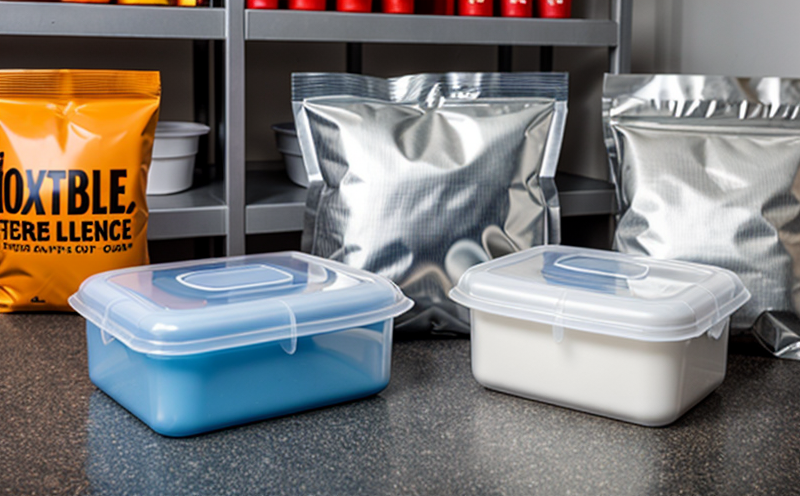ASTM D882-18 Tensile Strength under Controlled Conditions
The ASTM D882-18 standard is a critical tool in the packaging industry, particularly for assessing the tensile strength of thermoplastics used in flexible packaging materials. This test method evaluates how well a material withstands stretching before it breaks, which is crucial for ensuring product integrity and preventing leaks or tears during transit.
The process involves precisely measuring the force required to tear or rupture a sample cut from a roll of film or sheet under controlled conditions. The standard specifies a specific specimen shape and dimensions that are designed to simulate real-world stresses encountered in packaging applications, such as sealing lines or punctures caused by tampering.
Testing under controlled conditions ensures that the results can be compared reliably across different materials and manufacturers. This consistency is vital for quality control and compliance with international standards. The test also helps in optimizing material selection for specific applications, ensuring that the chosen packaging material meets both functional requirements and regulatory expectations.
The tensile strength measurement provides insights into a material's durability and flexibility, which are key factors in determining its suitability for various packaging uses. It is particularly important for products like bags, pouches, and shrink films where mechanical integrity plays a significant role in maintaining product freshness and safety.
In the context of flexible packaging testing, ASTM D882-18 complements other tests that evaluate barrier properties, puncture resistance, and peel strength. Together, these tests provide a comprehensive view of a material's performance characteristics, enabling informed decisions on material selection and process optimization.
Understanding the tensile strength under controlled conditions is essential for quality managers, compliance officers, R&D engineers, and procurement teams as it directly impacts product safety, shelf life, and overall consumer satisfaction. By adhering to this standard, manufacturers can ensure their packaging meets stringent industry requirements and international standards like ISO 14972, which emphasizes the importance of medical device packaging integrity.
Eurolab Advantages
- Expertise in ASTM Standards: Our team is well-versed in the latest ASTM D882-18 standards, ensuring accurate and reliable testing results.
- State-of-the-Art Equipment: We use advanced testing machines that adhere strictly to the specified parameters of ASTM D882-18 for consistent and precise measurements.
- Comprehensive Reporting: Our reports provide detailed insights into tensile strength, along with comparative analysis against industry benchmarks.
- Customized Testing Solutions: We offer tailored testing services to meet the specific needs of your packaging materials and applications.
At Eurolab, we pride ourselves on delivering accurate, reliable, and actionable test results that help you make informed decisions about your packaging solutions. Our commitment to precision and customer satisfaction ensures that you can trust our laboratory for all your flexible packaging testing needs.
International Acceptance and Recognition
The ASTM D882-18 standard is widely recognized and accepted in the global packaging industry. Its robust methodology ensures that tensile strength measurements are consistent, repeatable, and comparable across different laboratories worldwide.
This international acceptance is crucial for manufacturers who operate globally or supply materials to international markets. By adhering to ASTM D882-18, companies can ensure their products meet the quality expectations of diverse regulatory bodies and customers in various regions.
The standard's widespread use also fosters collaboration among industry stakeholders, promoting a shared understanding of best practices for tensile strength testing. This collaborative environment encourages continuous improvement in packaging technology and materials science.
Moreover, compliance with ASTM D882-18 is often a prerequisite for certification programs like ISO 9001:2015, which emphasize quality management systems. By integrating this standard into their processes, companies can demonstrate their commitment to excellence in manufacturing and customer satisfaction.
Competitive Advantage and Market Impact
- Enhanced Product Integrity: By accurately measuring tensile strength, manufacturers can ensure their packaging materials are robust enough to withstand the rigors of transport and storage.
- Improved Consumer Trust: Stronger packaging materials contribute to longer shelf life and better product protection, enhancing consumer confidence in brand reliability.
- <Cost Efficiency: Understanding tensile strength helps in optimizing material usage, reducing waste, and lowering production costs without compromising quality.
- Innovation Facilitation: The insights gained from ASTM D882-18 testing can drive innovation in packaging design and materials selection, giving companies a competitive edge in the market.
The ability to consistently measure tensile strength under controlled conditions is a significant advantage for companies seeking to differentiate themselves through superior product quality. It also facilitates smoother regulatory compliance and enhances overall brand reputation.





